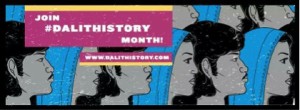We at the CFC believe that our work crosses issues and borders. We believe that transnational feminist solidary is a key element of feminist praxis for those of us who live in the US. We have much to learn from and share with feminist thinker and organizers from around the world. Over the month of April, to commemorate the first ever Dalit History Month, we will be sharing with you a series of posts to raise awareness about the history and organizing done by the Dalit community, in India and abroad. In coming weeks we will be sharing Dalit feminist voices here at the CFC. We hope that through this collaboration with the Crunk Feminist Collective and Dalit feminists from Dalit History Month Collective will spark more conversation about caste in India, and the consequences of the Indian caste system. Today we bring you the story of Dalit History Month.
Guest post from the Dalit History Month Collective (Christina Thomas Dhanraj, Vee Karunakarn, Thenmozhi Soundararajan, Asha Kowtal, Manisha Mashaal, Sanghapali Aruna Lohitakshi)
#DALITHISTORYMONTH is a participatory radical history project. We offer a parallel model of scholarship than the kind of work done at academic institutions that study Dalits without Dalits in collaborative or lead roles of research. We believe in the power of our stories to change the Savarna [upper-caste] narrative of our experience as one solely of atrocity into one that is of our own making. Our story may have begun in violence but we continue forward by emphasizing our assertion and resistance.
#DALITWOMENFIGHT is a movement led by Dalit women who believe in the power of collective action to break caste impunity and move towards a vision of justice for all. On one end of the spectrum, the campaign in India involves active grass-roots organising, incubation of young community leaders, survivor support initiatives and monitoring enforcement of the law. The other end of the spectrum is global advocacy to include caste-gender atrocity into the international rights discourse with the objective of holding India accountable to human rights standards.
We believe that in order to challenge the pipeline of impunity, we need new radical thinking around breaking several layers of oppression, including the appropriation of our knowledge and agency as women from the community.
Therefore, we have organised ourselves into the Dalit History Month Collective to launch several online and offline events to raise the visibility of Dalit History around the world. The centerpiece of our efforts is the participatory timeline accessible at www.dalithistory.com. We encourage everyone to browse this timeline and to send your contributions, suggestions, additions or references to our email dalithistorymonth@gmail.com. Our hope is that by next year this timeline will double in the amount of entries with our collective participation.
Today, Sunday April 5, 2015, we will also be hosting the first Dalit-led Wikipedia hackathon at Massachusetts Institute of Technology (MIT). We felt such an intervention was necessary as the status of Dalit History on Wikipedia is dismal. What little articles exist are often badly written and reflect Savarna or White- supremacist cis-heteropatriarchal points of view that are presented as neutral perspectives. Our goal then is help address this gap through our historic push to raise the visibility of Dalit authored and Dalit written articles in Wikipedia as well begin to collect all of the various Dalit History articles into one easily accessible page. You can watch the hackathon live HERE.
Our collective has also planned events in New Delhi, Bangalore, Mumbai, Haryana, NYC, Boston, Princeton, Houston and San Francisco, and Toronto. Even as we write this article, more collaborators are signing on. So if you are interested in hosting one in your community or classroom, please contact us at dalithistorymonth@gmail.com.
Throughout April, we will be posting one key leader or event from Dalit History to reflect and share with our online community in Facebook, Twitter, and Instagram (#DalitFeministsFight and #DalitHistoryMonth). We only ask our collaborators and supporters to help us get the word out by posting, reposting, and translating the material into your own languages whenever you can. We also encourage you to tag members of collectives in your reposts so if there are questions, we can begin to address them through the comments or tweets on send out.
This is time for us to weave intersectional approaches to our struggles for justice. We seek true solidarity, which is focused on dismantling a history of exploitation with the hope of a world where we all celebrate freedom, justice and peace.

